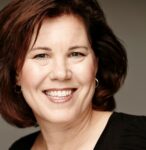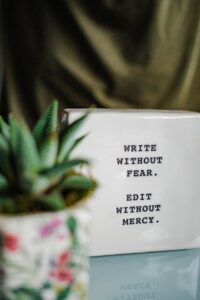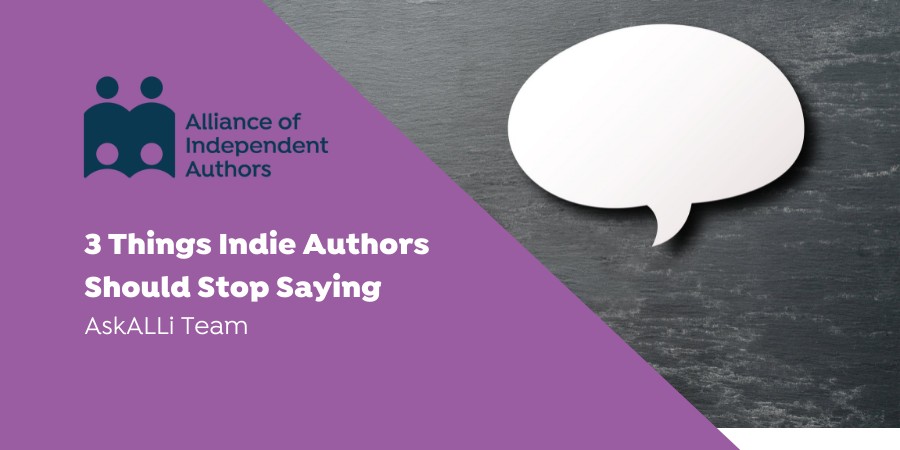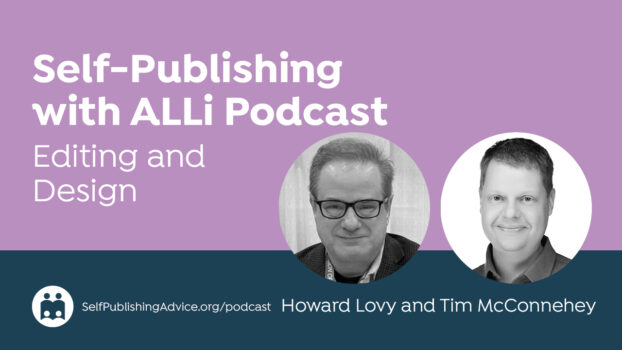Sometimes we indie authors get caught up in all kinds of “they said” and “we should because.” But should we? Did they? For every six figure indie who is in KU, there's another wide. For every indie in the romance genre there's another killing it in a niche. Today, the Alliance of Independent Authors gives you the three things indies should stop saying.
I Like Writing, I Don't Like [Marketing, Business, Selling… Insert Publishing Process of Choice!]
The minute you publish a book and earn money, be that thirty cents or three million dollars, you're in business. Trad, indie, hybrid, it doesn't matter. Once you create books and you offer them for sale, as far as the government and tax collectors are concerned, you're in business.
Which means there are certain tasks you're going to have to do.
Whether you like it or not, you need to tell your respective governments of your new form of income, be that via starting a company or registering as self-employed. This means tax and income documents. Does any creative enjoy doing these documents? We'd wager it's not high up on most creatives “favorite tasks” list. But do it we must.
There are so many facets to an author business, whether it's marketing, advertising, editing, writing, building mailing lists, responding to readers, the list is endless. Do you have to do them all yourself? No.
You could outsource some tasks, you could just avoid the tasks entirely. But what's your goal here? Do you want to produce books just for you? Do you want to write full-time? Do you want to be a part-time self-publisher while maintaining a part-time job?
The point is: whether you like it or not, there are some tasks that are compulsory if you want to grow your writing business. So why do so many authors who want to succeed simultaneously resist what they need to do if success is to happen?

CEO of Author Accelerator and Book Coach. “Saying you only want to write… is a way of staying small.”
We asked Jennie Nash, author of Blueprint for a Book: Build Your Novel from the Inside Out and founder and CEO of Author Accelerator, a company that certifies book coaches. Visit her at authoraccelerator.com. Connect with her on Facebook, Linkedin, or Twitter.
“At its root, this complaint, “I like writing but not…” is a form of protection,” Jennie says. “A kind of armor the writer puts on to keep themselves safe, and I don’t just mean safe from unpleasant tasks. I mean safe from declaring how much they care about their work and how much they want for it to succeed.
“Saying that you only want to write and don’t want to deal with the totality of what it means to be a writer is a way of staying small.
“Think of a big-time writer whose work is beloved – any writer, any genre: Stephen King, Adam Grant, Brene Brown. Do you imagine for one moment that these people don’t have to worry about marketing? About selling? About taxes? They are running million-dollar enterprises. Do you really think they get to just sit in a beautiful light-filled room and do nothing but write?
They do not. And neither do you.
“Playing big as a writer means taking responsibility for your career – for all parts of your career. Sure, some parts will be more pleasant than others, and some parts will tap into your zone of genius more than others. But true satisfaction comes from owning your ambition and committing to doing whatever you need to do to succeed. True satisfaction is taking ownership of the whole enterprise.”
Two: You Can Only Succeed If You…
The very nature of being an indie is breaking the mold. Being a creative means a certain amount of “thinking differently” and seeing outside the box. And yet, many indies get stuck thinking there is only one way to be an indie. There's an assumption you have to follow a certain business model or do what the “big names” are doing in order to succeed. But that's just not the case.
Assuming there's only one way stops you from looking for new and alternative options. It stops you thinking outside the box because there's a trodden path before you. But look at any industry, all the successful entrepreneurs, inventors, speakers, business people are those creatives who looked at the worn path and did something different.
Thinking there's only one genre, or one business model or one way of marketing is keeping you from success.
ALLi member Golden Angel agreed and said
“You have to be in KU to make money in that genre.” No. You really don't. And if everyone believes that, it just means lots of hungry readers for you on other platforms where people want that genre and have less content.
D Kirk Wall also agreed
The only way to be a successful indie author is _______ . (The fun is that there are so many different definitions of success and so many different ways to get there.)
Nora Phoenix is another author who has built an audience in a niche. At the 20Booksto50K Las Vegas conference in 2021, Nora explained how has built a community around her books and in doing so, reached multiple six figures in her business.
On the Six Figure Author podcast episode 115, fantasy author Katie Cross discusses how she makes multiple six figures by selling books direct on her website.
One again, we turned to Jennie Nash to understand her view as a coach.
“There is a certain kind of writer who wants to believe that success is a function of knowledge. They gather intel that is often presented as an absolute – you have to do X, you can’t do Y, no one sells books who does Z.
They are so busy trying to crack the code that they ignore the real nature of writing and publishing – which is an inherently personal and risky undertaking.
It’s emotionally much safer to go searching “out there” for a golden path to success than it is to look inside yourself for why you want to write this book, why you think other people will care, and what you need to learn to bring your vision to life.”
Three: My Book is for Everyone
No, really, it isn't. The number of times we've heard “my audience is everyone” or “I'm trying to appeal to as wide of an audience as possible” is unbelievable. You shouldn't be trying to appeal to a large audience.
Why?
Because readers of different genres, want different things. Authors, generally speaking, read across a much wider set of genres than the average reader. Most “average” readers find a genre they like and they don't deviate.
Octavia Randolph writes historical fiction, set in 9th century Scandinavia and England. Suffice to say: it's niche. Yet Octavia has managed to grow her business to multiple six figures by using business basics, nurturing her fans, building a mailing list, writing consistently in the same genre. Octavia focused on giving readers of historical fiction exactly what they wanted: well researched books with a level of historical accuracy and brilliant stories and characters. When Octavia first set out, she also bucked the trend by pricing high $9.99 for ebooks. Her prices range from $6.99 up.
The thing is, there are subtle nuances and differences even between subgenres. Steampunk is categorized as fantasy, but it requires a very different kind of cover, treatment, positioning and set of tropes than… say paranormal, which is technically fantasy too.
It's easy to scorn “writing to market” but really, at its heart, it just means giving your readers what they want.
Whichever genre you write in, a reader has expectations. In writing crime, for example, it's no good writing about petty theft by a delinquent teen. That's not big enough or ugly enough for a reader to invest. They want murders and kidnappings, underground gangs and human trafficking. But there are other expectations too, like the tone of the story and the style and depth of description and dialogue. And if it's literary crime, all of that might go out the window.
So do you have to write to market? Well, no. But what are your goals? If you just want to write the story in your heart, then go for it. But then do manage your expectations around how many books you're likely to sell.
Ultimately, it's a choice. If you choose not to understand or feed the market, it's harder to sell your book, but if sales isn't your goal, then it's vastly less important.
Therefore, writing to market really means understanding what readers of your particular genre want, and delivering that. It's impossible to appeal to everyone because not everyone likes everything. Some people like knitting, others martial arts. It's part of the beauty of humanity and the more we're able to embrace that as indie authors, the easier it is to sell our books.
Over to Jennie for her thoughts as a coach:
“Telling yourself that your book is going to speak to everyone – or to a massive subset of everyone, such as all moms or athletes or home cooks or job seekers – may feel inspiring, but it will lead you to writing a book that speaks to no one.
You know that feeling of thinking a writer knows you? That they have somehow seen into your soul? That doesn’t come from a writer setting out to speak to everyone. It comes from imagining a specific reader who is coming to your book for a specific reason.
Does your reader want to be educated or entertained? Are they looking for inspiration or solace?
Zeroing in on this ideal reader can feel counterintuitive; it can feel like closing doors when all you want is to get as many people to read your book as you can. But if you give your ideal reader what they want, chances are high they will press your book into the hands of other people who need the same thing. In this way, your book will have a fighting chance of making an actual impact.”
ALLi member Ella M. Kaye says
“What's your marketing plan? Always know your audience before starting your book.” I know a lot of writers write to sell, but that doesn't have to be your main goal, even if it's one goal. Especially for indies, the beauty is that you can write what you want/need to write and worry about marketing later. We need more heart books, more books written because the author needs to write them rather than for monetary goals. That's why indie came about!
“I wish authors would stop saying “write-to-market” when they really mean “write-to-trend.” Too totally different things.
ALLi Team Members on what Indie Authors Should Stop Saying

ALLi News Editor Dan Holloway
Dan Holloway
‘Write something every day', devised by people who seem not to have lives and who don't understand the whole ‘people are different' thing. Ditto its more general cousins: ‘If I can do it, anyone can' and ‘This worked for me so it will work for you'.
Not Needing Editors

ALLi Special Projects & UK Ambassador Debbie Young
Debbie Young
Lots of ALLi members agreed with Debbie on that one!
Sally Hanan
Writer: “You should hire my editor. She's great.” Reader: “She was not great.”
Karen Thornhill-Coulters
“I can edit it myself.” Yikes! No, just no.

Photo by hannah grace on Unsplash
Catherine Williams
“My book won't need proofreading because it was edited by my friend who is an English teacher.” In some 25 years, I've never yet worked on a book that had zero corrections after typesetting!
Chrissie Parker
“Can't I just edit it myself and make a cover in Canva?” Also, “I'm not a real writer if I'm self-published, to be a real writer I MUST have an agent and publisher and go the traditional route”
“An editor will change my unique voice, so I'll just let the readers be the judge.” No, no reader wants to pay for the privilege of editing your book. Don't be a jerk like that. If you want to charge for your book, you need to act like a professional.
“Readers should know to expect less from a self-published book, so it doesn't matter if my cover isn't good or my editing isn't tight.” Nope. See above re, If you want to charge for your book, you need to act like a professional.
“I chose fantasy/sci-fi/historical/contemporary so I wouldn't have to do research.” …Oh, we don't have time or space for me to comment on this one!
Rachel Wilkinson
“I don’t need an editor, my friend/partner is an English teacher/grammar and spelling Nazi” Pleeease hire a professional editor, trained and highly experienced in their job.
Other Things ALLi Members Think We Should Stop Saying
Elizabeth Hurley
“It’s my baby.” No it's not. It's your book.“Don’t waste your money on adverts until you have at least X number of books out” I started advertising two weeks before launch on a new title / new pen name. Told no one about it. Made thousands (net). Adverts can work from day one.
“My book comes out Friday — what should I be doing to promote it?”“I have writer's block.”
“Two things:
1. I hate social media/it doesn't work for me.2. I'm worried about emailing too much.
Both of these have the same cause and the same solution. The cause is people are still stuck in the 1990s and think that marketing is all about shouting, ‘LOOK AT ME! AREN'T I AMAZING? BUY MY BOOKS!' The solution is to stop making it about you. It isn't about you. It never was. It's about how you help/entertain your audience…which is what you're already doing with your books. So as long as you remember they're both ways to build relationships, and focus on doing that, it's a lot easier and more fun to create content for them. And they're more likely to sell books for you, too. End rant”
“Develop an email list. Nope. I won’t spam people. Useful when launching a new book, otherwise, no. And “self-published.” It's “independent author,” folks. Much more professional, polished, and unlikely to give the wrong impression.”
Wendy Ronning
You need to be on ALL social media platforms to be successful.
Jean Gill
“Here's a free copy of my book so you can read it and tell me what you think.” Feedback to other writers takes up a huge amount of precious writing time, is a privilege not a right, and if the book isn't in its final, well-edited form, that's an insult to any reader.
“I don't need to pay for a cover designer / editor / formatter – they charge too much anyway.” Appreciating fellow-professionals' skills is the first step to analysing your own shortcomings as a publisher and producing a book that's more than a document.
“My book needs to be 600 pages long.' No it doesn't.“It's not a proper book but you might like it.” Never diss or play down your own book! Be the publisher of your dreams – be proud of that book – and make sure it IS ‘proper' Successful Indie publishers have put that sense of failure/ shame / rejection behind them (yes, many of us have had all that AND been trad published at some point)
Berenice Smith
I found my ‘designer' on Fiverr and paid them a tenner. Why don't you charge the same rates (It's often unethical and a race to the bottom. Just like writing, design is skill and good design is worth an investment as are your readers).
“I hate… (getting emails more than once a month/ seeing pop ups on a website/ seeing keyword subtitles/ covers that look like others in a genre/ etc etc)” – ie people who make the mistake of assuming their own personal prejudices equate to the vast majority of readers. And yes I hate some or all of those things personally – BUT I am not my reader! And nor are you!“You were kind enough to let me read an ARC of your last novel. Now I would like to return the compliment and am pleased to send you this PDF of my own 150k word novel for your reading pleasure and to review.”“I’ve done all the courses and spent $x marketing my book but still no one wants to read it. What’s wrong?” Assumption being 1) the course must be rubbish 2) I’ve made a mistake (probably due to poor explanation offered by said course) but NEVER that 3) my book just might not be good enough.
Phillipa Clark
“How many rejections should I get from real publishers before I self-publish?” Aargh!
Jordan Wallace
“If someone asks an indie for advice Try not to respond with “Google it. That’s what I had to do.”
Whenever I share information on how I self published, writers will say “thank you so much for sharing your secrets!” Or “thank you so much for not keeping this all to yourself”
We should be lifting each other up. Not gatekeeping what worked for us. I’ve had three writers in the last week say that other authors wouldn’t give them advice and it breaks my heart that they’ve been running into people who don’t want to “share their secrets with the competition”. It’s because of the incredible indie authors who have shown me support and shared what worked for them that I was able to publish a 3 book series this year we’re in this together!”
Tiara King
“What drives me bananas are those who constantly talk about writer’s block and imposter syndrome as if they’re actually real. They’re not. Even psychologists say they’re not. In and of themselves they do not exist, they are just blanket phrases for very long list of issues, yet they are constantly spoken of and about as if every person/writer suffers from them. We don’t, and it’s irritating to be told we do. Especially by someone who thinks that because they suffer from “something” we all must.”





That’s a helpful perspective on targeting an ideal reader. However, focusing too narrowly might inadvertently exclude potential readers who could still connect with the core themes, even if their initial motivations differ. Perhaps a broader appeal, while maintaining the book’s essence, could ultimately reach a wider audience. Neglecting diverse interpretations could be viewed as Bad Parenting, in a way.
Some valuable insights that validate my recent choices to properly invest in my debut self-published (as an Independent Author – I like that!) memoir, and to not talk myself or others out of success. And most of all, stand in the shoes of the reader, respect them, they are your audience.
Yes! This article is SO relevant. I really love ALL the extra quotes from authors near the end. This post spoke to my heart. Thank you!
I wish authors would stop saying “write-to-market” when they really mean “write-to-trend.